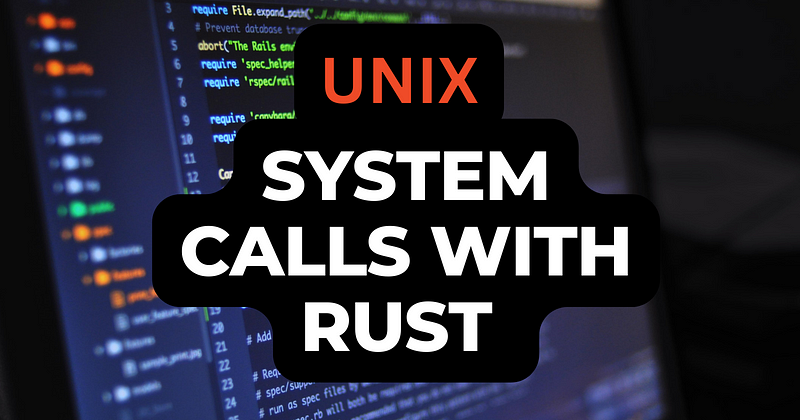Mastering Unix System Calls with Rust’s Nix Crate
Ever wanted to tap into the power of Unix system calls using Rust? You’re in the right place. In this article, we’ll delve into the nix…

Ever wanted to tap into the power of Unix system calls using Rust? You’re in the right place. In this article, we’ll delve into the nix crate, a Rust library designed to make Unix interactions smoother and safer. Whether you're new to Rust or a seasoned developer, this guide will help you leverage Unix's capabilities more effectively. Let's get started!
What is the Nix Crate?
The nix crate is a Rust library that provides Unix system call and libc binding functionalities. By leveraging nix, Rust developers can achieve native Unix functionality without dealing with raw system calls or C interop directly. The crate aims to provide a safe, convenient, and Rustic interface to these system functionalities.
Key Concepts and Features
1. Safety
Rust is known for its strong emphasis on safety, and nix embraces this philosophy. Instead of dealing with raw file descriptors or pointers, nix offers higher-level abstractions that encapsulate the underlying intricacies. It also ensures that resources are managed correctly, reducing the risk of leaks or other bugs.
2. Broad Coverage
The nix crate covers a wide array of Unix functionalities, including:
- Process management: forking, waiting, signals, etc.
- File operations: open, close, read, write, etc.
- Networking: socket creation, binding, listening, etc.
- User and group management.
3. Idiomatic Rust Interface
While it’s a wrapper around Unix system calls, nix presents an interface that feels idiomatic to Rust. It makes extensive use of Rust’s types, enums, and Result pattern to ensure that errors are handled appropriately.
Examples
To give you a taste of how the nix crate operates, let's dive into a few practical examples.
1. Forking a Process
Forking creates a child process. Here’s how you can use nix to fork a new process:
use nix::unistd::{fork, ForkResult};
match fork() {
Ok(ForkResult::Parent { .. }) => {
println!("I'm the parent!");
}
Ok(ForkResult::Child) => {
println!("I'm the child!");
}
Err(_) => {
eprintln!("Fork failed");
}
}2. Creating a Socket
Creating a socket is a foundational step in network programming. With nix, it becomes straightforward:
use nix::sys::socket::{socket, AddressFamily, SockType, SockFlag};
let fd = socket(AddressFamily::Inet, SockType::Stream, SockFlag::empty(), None)
.expect("Failed to create socket");3. Reading from and Writing to a File
The nix crate provides system calls like read and write, which can be used to interact with file descriptors. Here's a basic example of reading from and writing to a file:
use nix::fcntl::{open, OFlag};
use nix::sys::stat::Mode;
use nix::unistd::{read, write, close};
use std::os::unix::io::RawFd;
fn main() {
let path = "/tmp/nix_example.txt";
let buffer: &mut [u8] = &mut [0; 256];
let fd: RawFd = open(path, OFlag::O_RDWR | OFlag::O_CREAT, Mode::S_IRUSR | Mode::S_IWUSR)
.expect("Failed to open file");
let nbytes = write(fd, b"Hello, nix!")
.expect("Failed to write data");
let _ = lseek(fd, 0, SeekWhence::SeekSet)
.expect("Failed to seek to beginning");
let _ = read(fd, buffer)
.expect("Failed to read data");
close(fd).expect("Failed to close file");
println!("Read from file: {}", String::from_utf8_lossy(buffer));
}4. Handling Signals
Signals are an inter-process communication mechanism in Unix-like systems. With nix, handling signals becomes intuitive:
use nix::sys::signal::{signal, SigHandler, SIGINT};
use std::thread::sleep;
use std::time::Duration;
fn main() {
unsafe {
signal(SIGINT, SigHandler::Handler(handle_sigint))
.expect("Failed to set signal handler");
}
loop {
println!("Running... Press Ctrl+C to stop");
sleep(Duration::from_secs(2));
}
}
extern "C" fn handle_sigint(_: nix::libc::c_int) {
println!("\nSIGINT received. Exiting...");
std::process::exit(0);
}In this example, the program sets a custom signal handler for the SIGINT signal (typically triggered by Ctrl+C). When the signal is received, the program prints a message and exits.
5. Working with Pipes
Pipes are a way to pass data between processes. Here’s an example using pipe from nix:
use nix::unistd::{pipe, read, write};
fn main() {
let (read_fd, write_fd) = pipe().expect("Failed to create pipe");
match fork() {
Ok(ForkResult::Child) => {
let mut buffer: [u8; 128] = [0; 128];
read(read_fd, &mut buffer).expect("Failed to read from pipe");
println!("Child read: {}", String::from_utf8_lossy(&buffer));
}
Ok(ForkResult::Parent { .. }) => {
write(write_fd, b"Message from parent").expect("Failed to write to pipe");
}
Err(_) => eprintln!("Fork failed"),
}
}Here, a pipe is created, and a child process reads from it after the parent writes a message.
6. Managing User and Group Information
Unix-like systems have a concept of users and groups to manage permissions. The nix crate provides convenient wrappers to interact with user and group data:
use nix::unistd::{getuid, getgid};
fn main() {
let user_id = getuid();
let group_id = getgid();
println!("Current user ID: {}", user_id);
println!("Current group ID: {}", group_id);
}This snippet obtains and prints the current user’s UID (User Identifier) and GID (Group Identifier).

7. Working with Environment Variables
While Rust’s standard library provides ways to interact with environment variables, nix also exposes a more Unix-centric approach:
use nix::libc;
use std::ffi::CString;
fn main() {
unsafe {
let name = CString::new("PATH").expect("Failed to create CString");
let value = libc::getenv(name.as_ptr());
if !value.is_null() {
let value_str = std::ffi::CStr::from_ptr(value).to_string_lossy().into_owned();
println!("PATH: {}", value_str);
} else {
println!("PATH variable not found");
}
}
}This code retrieves the PATH environment variable using the nix crate's bindings.
8. Setting File Permissions
The nix crate allows developers to change the permissions of a file, utilizing the Unix permission model:
use nix::sys::stat::{chmod, Mode};
fn main() {
let path = "/tmp/nix_example.txt";
chmod(path, Mode::S_IRUSR | Mode::S_IWUSR).expect("Failed to change permissions");
println!("File permissions changed successfully");
}This sets the file’s permissions to be readable and writable only by the owner.
9. Retrieving Hostname
The hostname of a Unix-like system can be fetched using nix:
use nix::unistd::gethostname;
use std::ffi::OsString;
fn main() {
let hostname: OsString = gethostname().expect("Failed to get hostname");
println!("Hostname: {:?}", hostname);
}10. Setting Resource Limits
Unix systems provide ways to set resource limits for processes. With nix, you can get or set these limits:
use nix::sys::resource::{getrlimit, setrlimit, Resource, Rlimit};
fn main() {
let (soft_limit, hard_limit) = getrlimit(Resource::RLIMIT_NOFILE)
.expect("Failed to get file descriptor limit");
println!("File descriptor limits - Soft: {}, Hard: {}", soft_limit, hard_limit);
// Example: Set a new soft limit
setrlimit(Resource::RLIMIT_NOFILE, Rlimit::new(1024, hard_limit))
.expect("Failed to set file descriptor limit");
}11. Working with Directories
Navigating and managing directories is a common requirement. Here’s an example using nix to change the current working directory:
use nix::unistd::{chdir, getcwd};
fn main() {
let initial_path = getcwd().expect("Failed to get current directory");
println!("Initial path: {:?}", initial_path);
chdir("/tmp").expect("Failed to change directory");
let new_path = getcwd().expect("Failed to get current directory");
println!("After chdir: {:?}", new_path);
}12. Establishing Sessions
In Unix, sessions play a crucial role in process groups and terminal management. With nix, you can create a new session:
use nix::unistd::{setsid, getpid};
fn main() {
println!("Current process ID: {:?}", getpid());
match setsid() {
Ok(session_id) => {
println!("Started a new session with ID: {:?}", session_id);
},
Err(e) => {
eprintln!("Failed to start a new session: {}", e);
}
}
}13. Polling File Descriptors
nix provides the capability to poll file descriptors, which is useful for multiplexing input/output over multiple file streams:
use nix::poll::{poll, PollFd, POLLIN};
use nix::unistd::{pipe, read};
use std::time::Duration;
use std::thread;
fn main() {
let (read_fd, write_fd) = pipe().expect("Failed to create pipe");
thread::spawn(move || {
thread::sleep(Duration::from_secs(2));
write(write_fd, b"Data from another thread").expect("Failed to write to pipe");
});
let mut fds = [PollFd::new(read_fd, POLLIN)];
poll(&mut fds, 5000).expect("Poll failed");
if fds[0].revents().unwrap().contains(POLLIN) {
let mut buffer = [0u8; 128];
let _ = read(read_fd, &mut buffer).expect("Failed to read from pipe");
println!("Received: {}", String::from_utf8_lossy(&buffer));
}
}This example creates a pipe and waits for data to be available for reading using polling. Another thread writes data to the pipe after a delay.
14. Mounting and Unmounting Filesystems
With nix, you can also manage filesystems directly, including mounting and unmounting:
use nix::mount::{mount, umount, MsFlags};
fn main() {
let source = Some("/dev/sdb1");
let target = "/mnt/usbdrive";
let fstype = "vfat";
let flags = MsFlags::empty();
let data = None;
mount(source, target, Some(fstype), flags, data).expect("Failed to mount");
// ... your operations with the mounted filesystem ...
umount(target).expect("Failed to unmount");
}Note: This operation requires elevated privileges (typically root).
15. Terminating Processes
Ending or sending signals to processes is an essential aspect of process management:
use nix::sys::signal::{kill, Signal};
use nix::unistd::Pid;
fn main() {
let target_pid = Pid::from_raw(12345); // Replace with your target process ID
kill(target_pid, Signal::SIGTERM).expect("Failed to send signal");
}This example sends a SIGTERM signal to terminate a process with the specified PID.
16. Retrieving System Information
Understanding the system’s details, like the number of CPUs or system uptime, is often necessary. The nix crate provides such functionalities:
use nix::sys::utsname::uname;
fn main() {
let info = uname();
println!("System name: {}", info.sysname());
println!("Node name: {}", info.nodename());
println!("Release: {}", info.release());
println!("Version: {}", info.version());
println!("Machine: {}", info.machine());
}This code uses the uname function to fetch various system information pieces.
17. Working with Shared Memory
nix facilitates operations with System V shared memory:
use nix::sys::shm::{shmget, shmat, shmctl, Shmflg, IPC_RMID};
use nix::libc::key_t;
fn main() {
let key: key_t = 1234; // Some identifier for the shared memory segment
let size = 1024; // Size in bytes
let shmid = shmget(key, size, Shmflg::IPC_CREAT | Shmflg::IPC_EXCL).expect("Failed to create shared memory segment");
let data_ptr = shmat(shmid, None, Shmflg::empty()).expect("Failed to attach to shared memory segment");
// ... Use data_ptr to work with the shared memory ...
shmctl(shmid, IPC_RMID, None).expect("Failed to remove shared memory segment");
}This example demonstrates the creation, attachment, and removal of a shared memory segment.
18. Interacting with Terminals
Managing terminal settings is vital for creating tools like terminal multiplexers or text editors:
use nix::libc::tcgetattr;
use nix::sys::termios::{cfmakeraw, tcsetattr, TCSANOW};
use nix::unistd::isatty;
fn main() {
if !isatty(0) {
eprintln!("Not a terminal");
return;
}
let mut termios = unsafe { tcgetattr(0).expect("Failed to get terminal attributes") };
cfmakeraw(&mut termios);
tcsetattr(0, TCSANOW, &termios).expect("Failed to set terminal attributes");
// Terminal is now in raw mode, read/write as needed
// Reset terminal settings before exiting...
}This example checks if the standard input is a terminal and sets it to raw mode.
19. Querying System Load Average
Understanding system load is crucial for monitoring and management tools:
use nix::sys::sysinfo::loadavg;
fn main() {
let (one, five, fifteen) = loadavg().expect("Failed to get load averages");
println!("1-minute load average: {}", one);
println!("5-minute load average: {}", five);
println!("15-minute load average: {}", fifteen);
}This code fetches and prints the system’s 1, 5, and 15-minute load averages.
20. Interacting with Message Queues
System V message queues facilitate IPC (Inter-Process Communication) in Unix-like systems:
use nix::sys::msg::{msgget, msgsnd, msgrcv, MsgBuf, IPC_CREAT};
use nix::libc::key_t;
fn main() {
const MESSAGE_TYPE: i64 = 1;
let key: key_t = 5678;
let msgid = msgget(key, IPC_CREAT | 0666).expect("Failed to get message queue");
let send_buffer: MsgBuf<&[u8]> = MsgBuf::new(MESSAGE_TYPE, b"Hello, world!");
msgsnd(msgid, &send_buffer, 0).expect("Failed to send message");
let mut recv_buffer: MsgBuf<[u8; 128]> = MsgBuf::empty();
msgrcv(msgid, &mut recv_buffer, 0, MESSAGE_TYPE).expect("Failed to receive message");
println!("Received: {:?}", recv_buffer.text());
}This demonstrates sending and receiving messages using System V message queues.

21. Working with Semaphores
Semaphores are another IPC mechanism in Unix-like systems. Here’s how to create and manipulate a semaphore using the nix crate:
use nix::sys::sem::{semget, semop, Sembuf, IPC_CREAT};
use nix::libc::key_t;
fn main() {
let key: key_t = 7890;
let semid = semget(key, 1, IPC_CREAT | 0666).expect("Failed to get semaphore");
// Increment the semaphore's value
let operations = [Sembuf {
sem_num: 0,
sem_op: 1,
sem_flg: 0,
}];
semop(semid, &operations).expect("Failed to operate on semaphore");
// ... Work with the semaphore ...
// Remember to remove the semaphore when done to free resources.
}22. Working with Sockets and Netlink
nix offers facilities to work with Netlink, which is particularly valuable for querying and manipulating Linux networking:
use nix::sys::socket::{socket, bind, AddressFamily, SockType, SockAddr};
use nix::libc::nlmsghdr;
fn main() {
let fd = socket(AddressFamily::Netlink, SockType::Dgram, 0)
.expect("Failed to create socket");
let addr = SockAddr::new_netlink(0, 0);
bind(fd, &addr).expect("Failed to bind socket");
// Use fd to communicate with Netlink
// Make sure to read nlmsghdr structures and interpret based on your needs.
}23. Using Timers
Timers can be used for various purposes, such as timeouts or periodic notifications:
use nix::time::{timer_create, timer_settime, ClockId, TimerSetTimeFlags, Itimerspec};
use std::time::Duration;
fn main() {
let timer = timer_create(ClockId::CLOCK_MONOTONIC, None).expect("Failed to create timer");
let itimer = Itimerspec::new(
Duration::new(5, 0), // Interval (5 seconds in this example)
Duration::new(2, 0), // Initial expiration (2 seconds for the first time)
);
timer_settime(timer, TimerSetTimeFlags::empty(), &itimer, None).expect("Failed to set timer");
// The timer will now trigger based on the Itimerspec configuration
}24. Working with POSIX Message Queues
POSIX offers another set of message queues, which are different from System V queues:
use nix::mqueue::{mq_open, mq_send, mq_receive, MqFlags, MQ_O_CREAT, MQ_O_WRONLY};
use std::ffi::CString;
fn main() {
let queue_name = CString::new("/my_queue").expect("Failed to create CString");
let attr = None;
let mqd = mq_open(&queue_name, MqFlags::from_bits(MQ_O_CREAT | MQ_O_WRONLY).unwrap(), 0o600, attr).expect("Failed to open message queue");
mq_send(mqd, b"Hello POSIX mq!", 0).expect("Failed to send message");
let mut buffer = [0u8; 1024];
let _ = mq_receive(mqd, &mut buffer, 0).expect("Failed to receive message");
println!("Received: {}", String::from_utf8_lossy(&buffer));
}25. Allocating Memory
nix provides a way to request and release memory segments:
use nix::sys::mman::{mmap, munmap, MapFlags, ProtFlags};
use std::ptr::null_mut;
fn main() {
let addr = null_mut();
let length = 4096;
let ptr = mmap(addr, length, ProtFlags::PROT_READ | ProtFlags::PROT_WRITE, MapFlags::MAP_ANON | MapFlags::MAP_PRIVATE, -1, 0)
.expect("Failed to allocate memory");
// Use the ptr for your operations...
munmap(ptr, length).expect("Failed to deallocate memory");
}This example demonstrates allocating and deallocating an anonymous memory segment.
26. Monitoring File Changes
For applications that need to monitor changes in the filesystem, nix supports the inotify mechanism:
use nix::sys::inotify::{Inotify, WatchMask};
fn main() {
let mut inotify = Inotify::init().expect("Failed to initialize Inotify");
let path_to_watch = "/tmp/nix_watch";
inotify.add_watch(path_to_watch, WatchMask::IN_MODIFY).expect("Failed to add watch");
loop {
let events = inotify.read_events().expect("Failed to read events");
for event in events {
println!("Event on {}: {:?}", event.name, event.mask);
}
}
}
27. Creating Symlinks
Creating symbolic links (or symlinks) is another common operation in Unix systems:
use nix::unistd::symlink;
fn main() {
let original = "/tmp/original_file.txt";
let link = "/tmp/link_to_original.txt";
symlink(original, link).expect("Failed to create symlink");
}28. Querying Process Status
Understanding the status of a process is fundamental for tools like process managers:
use nix::sys::wait::{waitpid, WaitStatus};
use nix::unistd::Pid;
fn main() {
let child_pid = Pid::from_raw(12345); // Replace with an actual PID
match waitpid(child_pid, None) {
Ok(WaitStatus::Exited(pid, status)) => {
println!("Process {} exited with status {}", pid, status);
}
// Handle other statuses like WaitStatus::Stopped, WaitStatus::Continued, etc.
Err(e) => {
eprintln!("Failed to wait for PID {}: {}", child_pid, e);
}
}
}Wrapping Up: The Power of nix Unveiled!
Alright, fellow Rustaceans, let’s cap off our journey! We’ve trekked through the vast landscapes of the nix crate, uncovering its many treasures. From simple file operations to the intricate dance of inter-process communications, nix equips us with the tools to harness the raw might of Unix, all while snugly wrapped in the safety blanket of Rust.
If there’s one thing to take away, it’s this: With nix, we don't have to compromise. We get the best of both worlds—a Unix wizard's toolkit and Rust's promise of safety and expressiveness. So next time you're faced with a Unix challenge, remember that nix has got your back. Dive in, explore, and let your Rust code shine with the power of Unix by its side! 🚀🔧🦀

🦀 Ready to go beyond tutorials?
CodeCrafters is where software engineers become exceptional.
🔑 Sharpen Your Fundamentals
Recreate legendary software like Git and databases. Build the foundations that separate good developers from great ones.
⚡ Challenge Yourself
Work on projects that push your limits and build the confidence to tackle anything.
🌍 Learn from the Best
Join a community of engineers from Meta, Google, AWS, and more, sharing insights and solutions to real problems.
🚀 Future-Proof Your Career
Strengthen your skills through deliberate practice and become the developer everyone wants on their team.
This is your fast track to becoming a confident, standout engineer.
Stop practicing. Start mastering.
Join CodeCrafters Today!
🚀 Discover More Free Software Engineering Content! 🌟
If you enjoyed this post, be sure to explore my new software engineering blog, packed with 200+ in-depth articles, 🎥 explainer videos, 🎙️ a weekly software engineering podcast, 📚 books, 💻 hands-on tutorials with GitHub code, including:
🌟 Developing a Fully Functional API Gateway in Rust — Discover how to set up a robust and scalable gateway that stands as the frontline for your microservices.
🌟 Implementing a Network Traffic Analyzer — Ever wondered about the data packets zooming through your network? Unravel their mysteries with this deep dive into network analysis.
🌟Implementing a Blockchain in Rust — a step-by-step breakdown of implementing a basic blockchain in Rust, from the initial setup of the block structure, including unique identifiers and cryptographic hashes, to block creation, mining, and validation, laying the groundwork.
And much more!
✅ 200+ In-depth software engineering articles
🎥 Explainer Videos — Explore Videos
🎙️ A brand-new weekly Podcast on all things software engineering — Listen to the Podcast
📚 Access to my books — Check out the Books
💻 Hands-on Tutorials with GitHub code
🚀 Mentoship Program
👉 Visit, explore, and subscribe for free to stay updated on all the latest: Home Page
LinkedIn Newsletter: Stay ahead in the fast-evolving tech landscape with regular updates and insights on Rust, Software Development, and emerging technologies by subscribing to my newsletter on LinkedIn. Subscribe Here
🔗 Connect with Me:
- LinkedIn: Join my professional network for more insightful discussions and updates. Connect on LinkedIn
- X: Follow me on Twitter for quick updates and thoughts on Rust programming. Follow on Twitter
Wanna talk? Leave a comment or drop me a message!
All the best,
Luis Soares
luis@luissoares.dev
Lead Software Engineer | Blockchain & ZKP Protocol Engineer | 🦀 Rust | Web3 | Solidity | Golang | Cryptography | Author



